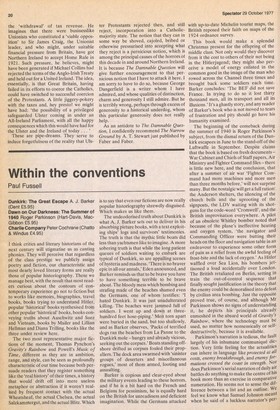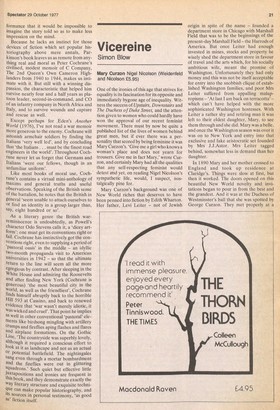Within the conventions
Paul Fussell
Dunkirk: The Great Escape A. J. Barker (Dent £5.95) Dawn on Our Darkness: The Summer of 1940 Roger Parkinson (Hart-Davis, MacGibbon £5.95) Charlie Company Peter Cochrane (Chatto & Windus £4.95) I think critics and literary historians of the next century will stigmatise us as canting phonies. They will perceive that regardless of the class prestige we publicly assign poetry and fiction, our characteristic and most dearly loved literary forms are really those of popular historiography. These we manage best, with the result that most readers curious about the contours of contemporary experience go not to fiction but to works like memoirs, biographies, travel books, books trying to understand Hitler, popular 'historical' books synthesised from other popular 'historical' books, books conveying truths about Auschwitz and Suez and Vietnam, books by Mailer and Lillian Hellman and Diana Trilling, books like the three under review here.
The two most representative major fictions of the moment, Thomas Pynchon's Gravity's Rainbow and Powell's Music of Time, different as they are in ambition, range, and style, can be seen as profoundly characteristic of our time because both persuade readers that they register something like the 'real history' of their times, a history that would drift off into mere useless metaphor or abstraction if it weren't realised by frequent contact with the actual Wheatsheaf, the actual Chelsea, the actual Salzkammergut, and the actual Blitz. Which is to say that even our fictions are now really popular historiography shrewdly disguised. Which makes us like them.
The undeodorised truth about Dunkirk is what A. J. Barker sets out to deliver in his absorbing picture books, with a text exploiting ships' logs and survivors' testimonies. The truth is that the mythic little boats did less than yachtsmen like to imagine. A more sobering truth is that while the long patient queues of soldiers waiting to embark are typical of Dunkirk, so are appalling scenes of hysteria and madness. 'There is no braver epic in all our annals,' Eden announced, and Barker reminds us that to be brave you have to have something terrible to be brave about. The bloody mess which bombing and strafing made of the beaches shamed even the Germans, one of whom testifies: 'I hated Dunkirk. It was just unadulterated killing. The beaches were jammed full of soldiers. I went up and down at threehundred feet hose-piping.' Men torn apart were buried in the sand, but too shallowly, and as Barker observes, 'Packs of terrified dogs ran the beaches from La Panne to the Dunkirk mole — hungry and already vicious, seeking out the corpses.' Boats standing offshore drifted as corpses fouled their propellers. The dock area swarmed with 'sinister groups of deserters and miscellaneous rogues,' most of them armed, looting and assaulting.
Barker is copious and clear-eyed about the military events leading to these horrors, and if he is a bit hard on the French and Belgians for pessimism, he is equally hard on the British for unreadiness and deficient imagination. While the Germans attacked with up-to-date Michelin tourist maps, the British reposed their faith on maps of the 1924 ordnance survey.
This book would make a splendid Christmas present for the offspring of the middle class. Not only would they-discover from it the cost to others of their not being in the Hitlerjugend; they might also perceive a model of energy enlisted in the common good in the image of the man who rowed across the Channel three times and brought back some soldiers each time. Barker concludes: 'The BEF did not save France. In trying to do so it lost thirty thousand men, all its transport and all its illusions.' It's a ghastly story, and any reader of Barker's book who is not moved to tears of frustration and pity should go have his humanity examined.
The beginning of the comeback during the summer of 1940 is Roger Parkinson's subject, from the dismal return of the Dunkirk escapees in June to the stand-off of the Luftwaffe in September. Despite claims that the book is based on fresh documents — War Cabinet and Chiefs of Staff papers, Air Ministry and Fighter Command files — there is little new here, and the conclusion, that after a summer of air war 'Fighter Command had more machines and more men than three months before,' will not surprise many. But the nostalgic will get a full ration:. the Anderson shelters, the silencing of the church bells and the uprooting of the signposts, the LDV waiting with its shotguns for the code-word 'Cromwell', and the British improvisation everywhere. A pilot of an obsolete Whitley bomber noted that because of the plane's ineffective heating and oxygen system, 'the navigator and Commanding Officer were butting their heads on the floor and navigation table in an endeavour to experience some other form of pain as a relief from the awful feeling of frost-bite and the lack of oxygen.' As Hitler waffled over Sea Lion, his bombers jettisoned a load accidentally over London. The British retaliated on Berlin, setting in train the out-of-control sequence that finally sought justification in the theory that the enemy could be demoralised into defeat by civilian area bombing. Just the opposite proved true, of course, and although Mr Parkinson shows no signs of understanding it, he depicts his principals already enmeshed in the absurd world of Gravity's Rainbow, where the technology must be used, no matter how nonsensically or self destructively, because it is available.
Parkinson's narration is tedious, the fault largely of his inhumane communiqué diction. Very little feeling for the actualities can inhere in language like protected at all costs, enemy breakthrough, and enemy formations crossed the coast in strength. NOT does Parkinson's serial narration of daily air battles do anything to make the centre of his book more than an exercise in comparative numeration. He seems not to sense the difference between a list and an outline. We feel we know what Samuel Johnson meant when he said of a luckless narrator's per formance that it would be impossible to imagine the story told so as to make less impression on the mind.
Because he lacks an instinct for those devices of fiction which set popular historiography above mere annals, Parkinson's book leaves us as remote from anything real and moral as Peter Cochrane's civilised, modest memoir of C Company, The 2nd Queen's Own Cameron Highlanders from 1940 to 1944, makes us intimate with it. But still with a winning dispassion, the characteristic that helped him survive nearly four and a half years as platoon leader, second-in-command, and CO of an infantry company in North Africa and Italy, and to survive wounds and capture and rescue as well.
Except perhaps for ,Eden's Another World (1976), I've not read a war memoir more generous to the enemy. Cochrane will astonish armchair soldiers by finding the Italians 'very well led', and by concluding that 'the Italians. . . must be the finest road engineers in the world'. Throughout Cochrane never let us forget that Germans and Italians 'were our fellows, though in an unfamiliar uniform'.
Like most books of moral use, Cochrane's contains a virtual mini-anthology of maxims and general truths and useful observations. Speaking of the British sense of the battalion, he notes that the British in general 'seem unable to attach ourselves to or find an identity in a group larger than, say, eight hundred or so'.
As a literary genre the British warrem iniscence is undoubtedly, as Powell's character Odo Stevens calls it, a 'dicey artform': one must get its conventions right or fail. Cochrane has instinctively got the conventions right, even to supplying a period of 'Pastoral oasis' in the middle — an idyllic two-month propaganda visit to American universities in 1942 — so that the ultimate return to the line will seem all the more egregious by contrast. After sleeping in the White House and admiring the Roosevelts and after finding New York (Cochrane is generous) 'the most beautiful city in the world, as well as the friendliest', Cochrane finds himself abruptly back to the horrible Hill 593 at Cassino, and back to renewed evidence that 'war wasn't merely idiotic, it was wicked and cruel'. That point he implies as well in other conventional 'pastoral' elements like birdsong mingling with artillery crumps and fireflies aping flashes and flares and airplane formations. On the Gothic Line, 'The countryside was superbly lovely, although it required a conscious effort to look at it as landscape and not as an actual or potential battlefield. The nightingales sang even through a mortar bombardment and the fireflies were out in glittering squadrons. Such quiet but effective little Juxtapositions and ironies are frequent in this book, and they demonstrate exactly the way literary structure and exquisite technique can make popular historiography, and its sources in personal testimony, 'as good as' fiction itself.



































 Previous page
Previous page